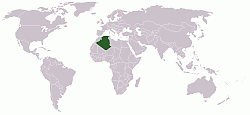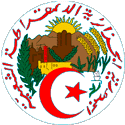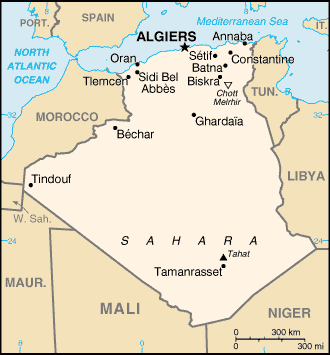Algeria
|
|
The People’s Democratic Republic of Algeria, or Algeria, is a nation in north Africa, and the second largest country on the African continent. It is bordered by Tunisia in the northeast, Libya in the east, Niger in the southeast, Mali and Mauritania in the southwest, and Morocco as well as a few kilometers of its annexed territory, Western Sahara, in the west. The name Algeria is derived from the name of the city of Algiers; from the Arabic word al-jazā’ir, which translates as the islands, referring to the four islands which lay off that city's coast until becoming part of the mainland in 1525.
| |||||
| National motto (translation): The Revolution by the people and for the people | |||||

| |||||
| Official language | Arabic | ||||
| Second language | Berber, French unofficial but commonly used in administration | ||||
| Capital - Population: - Coordinates: | Algiers الجزائر (El Djazaﲬ Al-Jazੲ) 1,507,241 (1987) Template:Coor dm | ||||
| Head of State | Abdelaziz Bouteflika, President | ||||
| Head of Government | Ahmed Ouyahia, Prime Minister | ||||
| Area - Total: - % water: | Ranked 11th 2,381,740 km² Negligible | ||||
| Land borders Coastline | 6,343 km 998 km | ||||
| Population - Total: - Density: | Ranked 34th 32,818,500 (2002) 13.3/km² | ||||
| Independence | From France July 5, 1962 | ||||
| National Day | 1 November | ||||
| Religions | Sunni Islam (state religion) | ||||
| Currency | Algerian dinar (DA) = 100 centimes | ||||
| Time zone | CET (UTC+1) | ||||
| National anthem | Kassaman (Qassamman Bin Nazilat Il-Mahiqat) (Arabic: We Swear By The Lightning That Destroys) | ||||
| Internet TLD | .dz | ||||
| Calling Code | 213 | ||||
| Contents |
History
Main article: History of Algeria
Algeria has been inhabited by Berbers (or Amazigh) since at least 10,000 BC. From 1000 BC on, the Carthaginians became an influence on them, establishing settlements along the coast. Berber kingdoms began to emerge, most notably Numidia, and seized the opportunity offered by the Punic Wars to become independent of Carthage, only to be taken over soon after by the Roman Republic in 200 BC. As the Roman Empire collapsed, the Berbers became independent again in much of the area, while the Vandals took over parts until expelled by Justinian's generals. The Byzantine Empire then retained a precarious grip on the east of the country until the coming of the Arabs in the 8th century.
After some decades of fierce resistance under leaders such as Kusayla and Kahina, the Berbers adopted Islam en masse, but almost immediately expelled the Caliphate from Algeria, establishing an Ibadi state under the Rustamids. Having converted the Kutama of Kabylie to its cause, the Shia Fatimids overthrew the Rustamids, and conquered Egypt. They left Algeria and Tunisia to their Zirid vassals; when the latter rebelled and adopted Sunnism, they sent in a populous Arab tribe, the Banu Hilal, to weaken them, thus incidentally initiating the Arabization of the countryside. The Almoravids and Almohads, Berber dynasties from the west founded by religious reformers, brought a period of relative peace and development; however, with the Almohads' collapse, Algeria became a battleground for their three successor states, the Algerian Zayyanids, Tunisian Hafsids, and Moroccan Merinids. In the fifteenth and sixteenth centuries, Spain started attacking and taking over many coastal cities, prompting some to seek help from the Ottoman Empire.
Algeria was brought into the Ottoman Empire by Khair ad-Din and his brother Aruj, who established Algeria's modern boundaries in the north and made its coast a base for the corsairs; their privateering peaked in Algiers in the 1600s. Piracy on American vessels in the Mediterranean resulted in the First and Second Barbary War with the United States. On the pretext of a slight to their consul, the French invaded Algiers in 1830; however, intense resistance from such personalities as Emir Abdelkader made for a slow conquest of Algeria, not technically completed until the early 1900s when the last Tuareg were conquered.
Meanwhile, however, the French had made Algeria an integral part of France, a status that would end only with the collapse of the Fourth Republic. Tens of thousands of settlers from France, Italy, Spain, and Malta moved in to farm the Algerian coastal plain and occupy the most prized parts of Algeria's cities, benefiting from the French government's confiscation of communally held land. People of European descent in Algeria (the so-called pieds-noirs), as well as the native Algerian Jews, were full French citizens starting from the end of the 19th century; by contrast, the vast majority of Muslim Algerians remained outside of French law, and possessed neither French citizenship nor the right to vote. Algeria's social fabric was stretched to breaking point during this period: literacy dropped massively, while land confiscation uprooted much of the population.
In 1954, the National Liberation Front (FLN) launched the guerrilla Algerian War of Independence; after nearly a decade of urban and rural warfare, they succeeded in pushing the French out in 1962. Most of the 1,025,000 pieds-noirs, as well as 91,000 harkis (pro-French Muslim Algerians serving in the French Army), together forming about 10% of the population of Algeria in 1962, fled Algeria for France in just a few months in the middle of that year.
Algeria's first president, the FLN leader Ahmed Ben Bella, was overthrown by his former ally and defense minister, Houari Boum餩议e in 1965. The country then enjoyed almost 25 years of relative stability under the one-party socialism of Boumedienne and his successors.
In the 1990s, Algeria was engulfed in a protracted and violent civil war after the military prevented an Islamist political party, the Islamic Salvation Front from taking power following the country's first multiparty elections. More than 100,000 people were killed, often in unprovoked massacres of civilians by guerrilla groups such as the Armed Islamic Group.
Politics
Main article: Politics of Algeria
The head of state is the President of the republic, who is elected to a 5-year term, renewable once. Algeria has universal suffrage. The President is the head of the Council of Ministers and of the High Security Council. He appoints the Prime Minister who also is the head of government. The Prime Minister appoints the Council of Ministers.
The Algerian parliament is bicameral, consisting of a lower chamber, the National People's Assembly (APN), with 380 members and an upper chamber, the Council of Nation, with 144 members. The APN is elected every 5 years.
Algeria has been a political maverick in the Maghreb, making it difficult to create the Moroccan Maghreb Arab Union, proposed in 1989. Throughout the 1960's, Algeria supported many independence movements in sub-Saharan Africa, and was a leader in the Non-Aligned Movement. Tensions over Western Sahara (Algeria supporting the right to self-determination of the Saharawis) have caused tension with Morocco.
Administrative Divisions
Main article: Provinces of Algeria
Algeria is divided into 48 wilayas (provinces):-
| Missing image
Algeria_provinces.png Map of the provinces of Algeria in alphabetical order. |
Geography
Main article: Geography of Algeria
Most of the coastal area is hilly, sometimes even mountainous, and there are few good harbours. The area just south of the coast, known as the Tell, is fertile. Further south is the Atlas mountain range and the Sahara desert. Algiers, Oran and Constantine are the main cities.
Algeria's climate is arid and hot, although the coastal climate is mild, and the winters in the mountainous areas can be severe. Algeria is prone to sirocco, a hot dust- and sand-laden wind especially common in summer.
See also: Extreme points of Algeria
Economy
Main article: Economy of Algeria
The hydrocarbons sector is the backbone of the economy, accounting for roughly 60% of budget revenues, 30% of GDP, and over 95% of export earnings. Algeria has the fifth-largest reserves of natural gas in the world and is the second largest gas exporter; it ranks 14th in Petroleum reserves.
Algeria’s financial and economic indicators improved during the mid-1990s, in part because of policy reforms supported by the IMF and debt rescheduling from the Paris Club. Algeria’s finances in 2000 and 2001 benefited from an increase in oil prices and the government’s tight fiscal policy, leading to a large increase in the trade surplus, record highs in foreign exchange reserves, and reduction in foreign debt. The government's continued efforts to diversify the economy by attracting foreign and domestic investment outside the energy sector has had little success in reducing high unemployment and improving living standards. In 2001, the government signed an Association Treaty with the European Union that will eventually lower tariffs and increase trade.
Demographics
Main article: Demographics of Algeria
About 90% of the Algerians live in the northern, coastal area, although there are about 1.5 million people living in the southern desert most of them in oases. The mixed Berber and Arab population is mostly Islamic (99%); other religions are restricted to extremely small groups, mainly of foreigners.
Language
Main article: Languages of Algeria
The official language is Arabic, spoken natively in dialectal form ("Darja") by some 80% of the population; the other 20% or so speak Berber, officially a national language. French is widely known from schools, but is very rare as a native language.
Culture
Main article: Culture of Algeria
See also: Music of Algeria, List of Algerian writers, Islam in Algeria.
Miscellaneous topics
- Communications in Algeria
- Transportation in Algeria
- Military of Algeria
- Foreign relations of Algeria
- Archeology of Algeria
- List of cities in Algeria
- List of sovereign states
External links
Government
- El Mouradia (http://www.el-mouradia.dz) official presidential site (in French and Arabic)
- National People's Assembly (http://www.apn-dz.org/apn/english/index.htm) official parliamentary site
- The Embassy of Algeria in Washington, DC (http://www.algeria-us.org/)
News
- allAfrica.com - Algeria (http://allafrica.com/algeria/) news headline links
- El Khabar (http://www.elkhabar.com/html/pageAnglais.html)
- Liberte (http://www.liberte-algerie.com/) (in French)
- The North Africa Journal (http://www.north-africa.com/one.htm) business news
- La Tribune (http://www.latribune-online.com/) (in French)
- El Watan (http://www.elwatan.com/) (in French)
- Yahoo! Full Coverage - Algeria (http://story.news.yahoo.com/fc?cid=34&tmpl=fc&in=World&cat=Algeria) news headline links
Overviews
- CIA World Factbook - Algeria (http://www.cia.gov/cia/publications/factbook/geos/ag.html)
- Library of Congress - Country Study: Algeria (http://lcweb2.loc.gov/frd/cs/dztoc.html) data as of December 1993
Directories
- Arab Gateway - Algeria (http://www.al-bab.com/arab/countries/algeria.htm) directory category
- LookSmart - Algeria (http://search.looksmart.com/p/browse/us1/us317916/us559898/us559899/us10065673/us559902/) directory category
- Open Directory Project - Algeria (http://dmoz.org/Regional/Africa/Algeria/) directory category
- The Index on Africa - Algeria (http://www.afrika.no/index/Countries/Algeria/) directory category
- University of Pennsylvania - African Studies Center: Algeria (http://www.sas.upenn.edu/African_Studies/Country_Specific/Algeria.html) directory category
- Yahoo! - Algeria (http://dir.yahoo.com/Regional/Countries/Algeria/) directory category
Tourism
Other
- Algeria Watch (http://www.algeria-watch.org/francais.htm) human rights organization critical of widespread torture practiced by the r駩me (in French)
- All Provinces (Wilayas) of Algeria (http://algerie.el-annabi.com) (in French)
| Countries in Africa | ||
|
Algeria | Angola | Benin | Botswana | Burkina Faso | Burundi | Cameroon | Cape Verde | Central African Republic | Chad | Comoros | Democratic Republic of the Congo | Republic of the Congo | Côte d'Ivoire | Djibouti | Egypt | Equatorial Guinea | Eritrea | Ethiopia | Gabon | The Gambia | Ghana | Guinea | Guinea-Bissau | Kenya | Lesotho | Liberia | Libya | Madagascar | Malawi | Mali | Mauritania | Mauritius | Morocco | Mozambique | Namibia | Niger | Nigeria | Rwanda | São Tomé and Príncipe | Senegal | Seychelles | Sierra Leone | Somalia | Somaliland | South Africa | Sudan | Swaziland | Tanzania | Togo | Tunisia | Uganda | Zambia | Zimbabwe | Western Sahara | ||
| Dependencies: Canary Islands | Ceuta and Melilla | Madeira Islands | Mayotte | Réunion | Saint Helena and dependencies | ||



